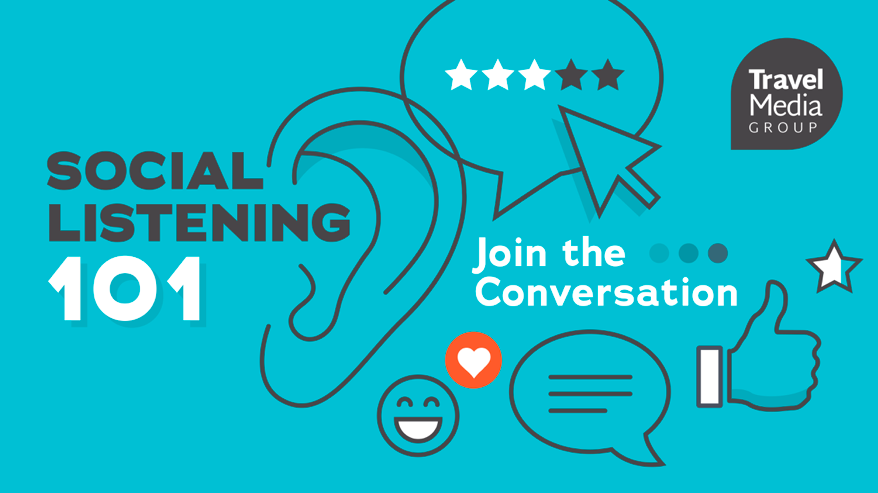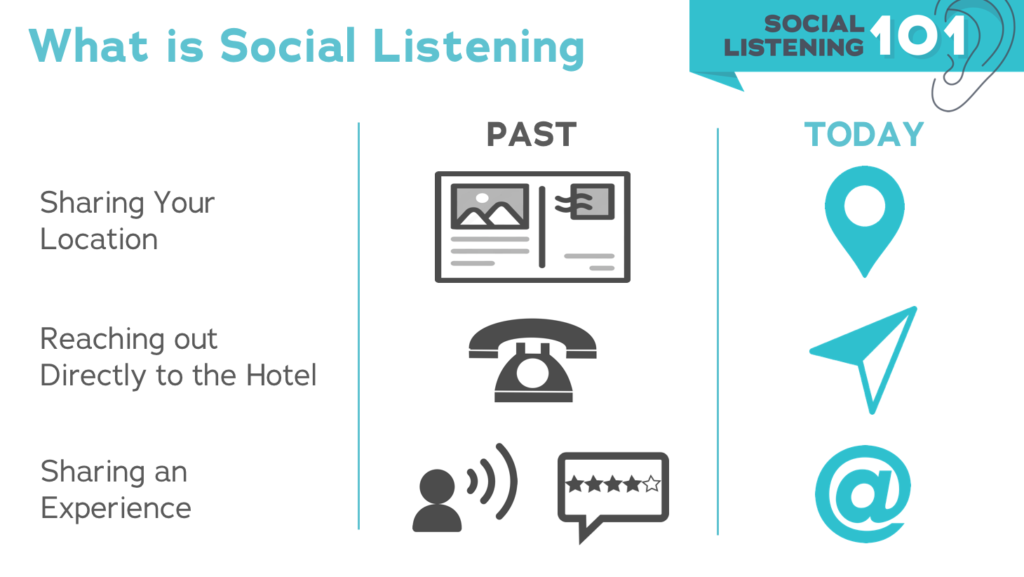Social Listening 101 – Join the Conversation [Webinar]

Social Media has given new meaning to the popular phrase “word of mouth.” In 2021, travelers are constantly mentioning, tagging, and talking about your property online. There are so many unique ways that travelers discuss your hotel on social media platforms, including Facebook, Twitter, and Instagram. We will teach you how to be a part of these conversations and use them to expand your reach and generate leads. Let’s showcase some helpful tools and strategies to monitor and respond to this online dialogue.

Let’s start by defining what social listening is. The best and easiest way to explain it is to really relate it to things travelers and guests have already been doing for decades.
- Sharing a Traveler’s Location – In the past, travelers used to purchase postcards to send to their family and friends letting them know what destination they were at. Today, travelers can simply share their location via social media, not only revealing their destination to others but pinpointing their exact location, even down to the specific hotel they are staying at.
- Reaching Out Directly to a Property – In the past, when a traveler had a question or wanted to reach the hotel directly they would typically have to pick up their phone and physically call the front desk. Now, a traveler can simply send a Direct Message or DM via social media and expect almost an immediate response from the property.
- A Guest Sharing a Hotel Experience – In the past, travelers relied on word of mouth: telling friends and family about their stay. More recently, guests leave online reviews on reputation sites post-stay. Today, a traveler can @Mention and tag the property on social media and tell you how they are experiencing the hotel in real-time.
So all of these are examples of social interaction between traveler and hotel. Social listening is the act of responding and connecting to your guests via social channels. Let’s talk through where social listening is happening right now, platform by platform, and the type of interactions that can happen between hotel and guest.
Let’s start with the most popular social media platform: Facebook.
- Location – Users on Facebook have the ability to share their specific location when posting a picture, video, or general post.
- Mentions – A user can also mention or tag the property on Facebook, inviting your business to be a part of the conversation they are sharing online with their followers. One thing to keep in mind is your hotel’s Facebook page name. If you are simply named the Holiday Inn Express, when travelers share their location and tag the property, others seeing the post might not be able to pinpoint which Holiday Inn Express the user is mentioning. Add more details to your name so other travelers know exactly what hotel the user is tagging.
- Direct Message – If a Facebook user is looking for more of a one-on-one interaction with the property, they have the ability to direct message the hotel through Facebook messenger. Travelers can use this feature to ask the hotel questions or submit requests once on property. It’s critical to respond to these messages as quickly as possible since most guests expect an immediate response and the information may not be relevant hours or even minutes later.
- Comments – Users also have the ability to comment on different types of content on Facebook: your hotel’s content, other travelers’ content, even things like reviews and recommendations.
- Reactions – And If users don’t want to take the time to comment on a post they can still react to it. Facebook reactions are unique because, unlike most social platforms, users have the ability to react in more ways than one. This can become extremely problematic for hotels if guests and travelers react negatively to content posted either by you or another traveler.
- Sharing – Facebook users have the ability to share your hotel’s content or with the permission of the traveler share theirs. Facebook sharing can be extremely beneficial for hotels because it can exponentially increase the number of traveler’s eyes on your content.
Let’s move on to the next social platform: Instagram. Now Instagram does have some similarities to its parent company Facebook, but there are some key differences.
- Location – If you were to sign in to Instagram and type in your hotel’s address you would see all the public Instagram posts shared by guests and travelers at your location. Sometimes these posts can be from influencers and have thousands of likes. Keep an eye out for these types of posts, you could use them to your advantage in the future.
- Direct Message – Although not used quite as frequently as Facebook, you still have the ability to receive direct messages from guests and travelers on Instagram.
- Comments and Likes – Comments on Instagram tend to be shorter and more positive in nature since the platform is used to show users more candidly “living their life,” which makes for an excellent space for hotels to advertise and market their properties.
The next social platform, Twitter, sometimes does not share that same feeling of positivity and a filtered life. Instead, it is used more for information and news.
- Comments and Mentions – On Twitter users have the ability to comment on posts and even mention/tag your business in a post. Users could use this to get your hotel’s attention to an issue they are having on property or a question they might have.
- Retweeting – Twitter’s version of sharing. We see this a lot when important, time-sensitive information is being shared and the hotel or traveler is trying to increase the visibility of that message. This is an extremely useful tool during things like a winter storm, hurricane, or something that everyone is familiar with, COVID-19.
Although not the most popular platform, there are a lot of travelers’ eyes on Twitter looking for relevant information and content important to them.
During the COVID-19 pandemic, Linkedin became a vital outlet for hotels to network with group decision-makers and make meaningful connections online. In fact, according to Omnicore data, there are 63 million users in decision-making positions at their company on Linkedin. So it is more important than ever to engage on this platform.
- Comments and Reactions – Similar to Instagram, Linkedin is mostly a place of positivity, where users share and celebrate professional accolades and achievements. Make sure your hotel’s content on this platform reflects that in order to maximize the number of comments and likes your property’s posts receive.
- Tags/Mentions – This can be a huge win for a hotel if they are ever tagged or mentioned by a group or individual attending an event hosted by and at the property.
- Sharing – Make sure your hotel is sharing posts from other local businesses and business associations in your area, we saw a lot of this during the pandemic as some were struggling and in need of help. Also, make sure the content you are posting is sharable! Creating a post specifically reaching out to wedding planners/groups could result in a number of shares and big revenue potential.
Filtering the Social Noise
With these interactions, social listening represents the opportunity to connect and engage with your online audience. The more followers you have the more online noise that creates for your hotel. So the question is, how do we filter through and organize that noise and use social listening to our advantage?
That’s where the TMG OneView® Feed comes in. This intuitive feed notifies and alerts you as soon as a traveler interacts with the hotel in any of the ways that we listed above. You can even engage back to the guest, directly from this feed. Liking, sharing, and commenting on posts. Without this feed, you are stuck signing into multiple social platforms hoping you catch a Facebook message or tweet at the exact moment someone messages the property. Be sure to check out TMG’s OneView® Feed and learn how it can make social listening easier and efficient for your hotel.





0 Comments